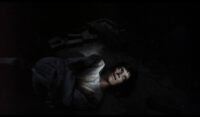And so we return once again to London for our coverage of the 66th London Film Festival. There are some great films on the 2022 roster and we hope to bring you more coverage from the festival itself than ever before. With the virtual viewing library operating somewhat differently this year we’ll be grouping the films the same way that the Festival’s organizers have, beginning with their “Thrill” program, presenting us with a duology of thrillers from opposite sides of the globe.
The Woman in the White Car (dir. Christine Ko, South Korea)
Thriller is a bit of a miscategorisation with our first film though, as although The Woman in the White Car sets itself up as a conventional thriller of the week with a cable-tv era aesthetic, the deeper it delves into its own mystery the more it rewards your interest. Layer by layer it pulls back its tangled web of contradictory flashbacks, each one seeming more credible than the last, until the full picture is revealed and you’re left smiling at its cunning.
The title immediately evokes Wilkie Collins’s The Woman in White, considered one of the first true mystery novels and still one of the very best. The Woman in the White Car earns that pedigree, not as a stealth modernized adaptation—which is what I repeatedly believed it was about to turn into— but as a riff on some of the broadest narrative strokes (a pair of sisters, kidnapping, mistaken identities, a woman committed, opportunists out for an inheritance) all approached from a variety of different perspectives. The structuring of these flashbacks occasionally leaves a little to be desired and it’s not uncommon for films to undergo re-editing between their festival runs and theatrical releases and this might be a candidate for some minor editorial changes to create a version that trusts its audience to remember things a little longer, but for the most part, it’s impressive how writer Seo Ja-Yeon and editor Jeong Kyoung Eun keep the audience abreast of the developing narrative.
Whenever we move into a flashback, the aspect ratio changes subtly and in the first flashback in particular, the image is rendered in an exaggerated, hyperreal style that mimics that used by lesser thrillers and pays off when we visit these locations in real life and the falsity of those initial accounts is all the more palpable. There’s a self-reflexive quality too in that a key character is a mystery writer herself, a minor biographical detail that takes on greater significance as the story goes on.
The film kicks off with a great thriller hook as a lone car drives through the wintry mountains (as for many a South Korean production, the natural landscapes are a great boon to The Woman in the White Car), pulls up at a provincial hospital and out staggers a desperate-looking woman (Ryeo-won Jung), barefooted, cradling her mortally wounded sister (Jang Jin-hee) in her arms. Assigned to the case of the titular woman is Police Sergeant Hyun-ju (Lee Jeong-eun) who takes the woman’s statement, but soon notices the holes in it. The more she learns, the less her story adds up, yet each new alternative still leaves a missing piece somewhere. There’s an almost Rashomon-like effect to the way plausible alternatives are presented, but Ko’s film is less concerned with the abstract nature of truth or the narratives we sell one another, but the emotions of the characters and their abilities to see through one another’s defenses and relate to each other.
Hyun-ju is a refreshingly characterized mystery protagonist, middle aged and professional in a way women are rarely allowed to be on film, her ability to unravel the mystery equally down to her confident professional conduct and her personal investment in the case. She’s a woman who knows the effects of emotional and physical abuse when she sees them and has her own demons to wrestle with. It’s a strong central performance from Lee and Jung is even better, giving a rare, surprisingly credible portrayal of schizophrenia. There is more to her character and story which does develop in a disappointing direction as far as maintaining standards of representation go, but for once those with mental health disorders are accurately portrayed as more likely to be the victims of violence than agents of it and the convincing and layered performance of Jung is vital to the film’s success.
There are some rather formulaic aspects to the story and especially to the film’s style of telling it, but these fall away as the film gathers momentum and keeps finding new ways to turn itself on its head. Director Christine Ko slowly overcomes the early wobbles and constructs an unobtrusively gripping narrative about learning to find one’s strength and overcome the emotional abuse that had you believing your desires and aspirations don’t matter. Stories of confronting and overcoming trauma are still very much in vogue today it seems, and The Woman in the White Car is a stronger exploration of these themes than we’ve become accustomed to. The bonds forged between the characters feel sincere, authoritative and expertly played, with little recourse to romanticizing or sexualizing their emancipation.
The Woman in the White Car is a rare film for having no acknowledged romantic dimension at all, without a single character whose sexuality is ever suggested. The platonic bonds between the characters are all the more genuine and aren’t made to suffer fetishization or a contrived pairing off of characters to provide cheap resolutions. This is an approach that feels distinctively feminine and mature, nurturing the generic roots of the story and taking it in a less sensationalist and more character-driven and emotive direction. With so many mystery thrillers and dramas in the field, it’s this kind of approach and emotional grounding that makes The Woman in the White Car feel one of the fresher of the bunch.
Ashkal (dir. Youssef Chebbi, Tunisia)
The festival’s “Thrill” program also brings us this French-Qatari-Tunis co-production, Ashkal. Like The Woman in the White Car it’s a police procedural where the definition of a thriller is being stretched to include drama and supernatural horror, and one that’s sadly short on actual thrills too. Screened at this year’s Director’s Fortnight at Cannes, the film opens with some local history on the Tunis district where it takes place, “The Gardens of Carthage”, a promised housing zone for the wealthiest in the city that was abandoned mid-construction following the fall of Ben Ali’s regime in 2010, leaving barren towers of concrete blocks, mere pencil sketches of the luxurious homes they were once destined to be. Eerie music plays, and these edifices are framed like leftover sets from ’70s science-fiction. Inside one of these cold husks, the body of a nightwatchman is found early one morning, dead by apparent suicidal self-immolation and although her superiors are quick to try and close the case, detective Fatma (Fatma Oussaifi) is convinced there’s more to the mystery as similar deaths start to follow.
The historical and political context Ashkal wastes no time before placing itself in is deeply relevant to its story, and though culturally specific in many ways, the contested place of police oversight and desire to hold officers accountable for their actions is one that’s become an issue of increasingly global discussion. An early scene where Fatma walks past prominently placed fresh graffiti reading “ACAB” could’ve come from a film set in the U.S., Britain, or many other countries. Sadly though, Ashkal fails to dive deeper into the issues much deeper than this. The murder investigation plays out in parallel to an oversight committee’s investigation of officers accused of committing human rights violations under the previous regime, one which Fatma’s superiors are eager to divert attention and resources away from, with the high-profile case a seeming perfect opportunity to do so.
There’s some commentary there about authorities whipping up hysteria and overblowing their achievements to make themselves seem irreplaceable, but that’s about as far as it goes. Fatma’s own father is testifying against the force, which earns her some childish mistrust and a few hostile comments from her colleagues, but this too doesn’t really go anywhere with Fatma never discussing her own feelings on the matter with her father or anyone else. Fatma’s partner Batal (Mohamed Grayaa), was on the force at the time and likely participated in the murders and illegal arrests, and is considering going clear and testifying against his superiors as well, but this decision isn’t explored in any detail either. Credit where it’s due though, this plot does reach somewhat of a conclusion, which is sadly more than I can say for any of the others.
Director Youssef Chebbi clearly invests a lot more in the aesthetic storytelling than the dialogue, relying heavily on the actors to convey their inner turmoil non-verbally. Given how slow moving and low-stakes the drama feels, one can’t help but feel he’s asking too much of his cast, giving them too little to work with. As The Woman in the White Car did with its remote mountainous countryside, Ashkal makes fantastic use of its urban locations, where the buildings’ dark, empty windows create picture frames for its tragedy and the flicker of flame carries for blocks after dark. Oussaifi gives a great performance, but there’s no doubt that the partially reclaimed Gardens of Carthage themselves are the real star of Ashkal.
There are enough ideas loose in Ashkal, about corruption, the legacy of dictatorships, the small-mindedness of authority, the inhuman treatment of migrants and the way social media spreads political radicalization, but they’re just kind of…there. They don’t go anywhere, develop or evolve and the story doesn’t do much to advance a perspective on any of them. With such little real character development to create stakes, and so many slow-paced, often repetitive scenes, all we’re left to ponder are the mechanics of the mystery, and the abstract themes the film is exploring. The mystery may or may not be supernatural in origin, so it’s hard to grapple with in a way that’s going to be satisfying, resolving in a manner as abstract and mysterious as in which it began.
Despite the fact there’s plenty of compelling frames in Ashkal, they do little to reinforce one another and while The Woman in the White Car only grew more gripping as it went on, by the final minutes of Ashkal my interest was on its last legs.



